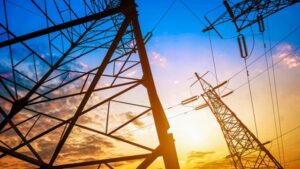
Transmission system operators (TSOs) of Ukraine, Slovakia, Hungary, and Romania launched the first monthly auctions for the allocation of cross-border capacity on Monday, according to Ukrenergo.
They are being held on December 15-17 on the Joint Allocation Office (JAO) platform with delivery in January 2026. The final results of the auctions are to be announced on December 23. According to information on the JAO, the capacity of the interconnection with Hungary is 460 MW, with Romania and Slovakia – 172 MW each. No interconnection capacity is offered from Ukraine.
“Long-term auctions for the allocation of cross-border transmission capacity are definitely beneficial for the Ukrainian electricity market. In the context of massive Russian attacks on our energy system, we really need confidence in a stable supply of electricity imports every month,” commented Vitaliy Zaychenko, chairman of the board of Ukrenergo, whose words are quoted in the company’s Telegram message.
“We are grateful to our partners at ENTSO-E and the JAO auction platform, as well as our colleagues from the energy system operators of neighboring EU countries for their effective cooperation. We hope that it will continue and that annual auctions will also be introduced in the future,” said Zaychenko.
According to NEC, the introduction of such auctions was made possible thanks to cooperation with TSOs of neighboring countries and with the support of the European Network of Transmission System Operators (ENTSO-E). Work on the rules for long-term allocation for the EU’s external borders has been ongoing for the past two years.
“After these rules were approved by the national regulators of Ukraine, Slovakia, Hungary, and Romania, it became possible to allocate free capacity at inter-state crossings through monthly long-term auctions. For Ukraine, this means more effective price forecasting and, in the long term, a reduction in the cost of imported electricity,” Ukrenergo explained.
As noted in the report, on a global scale, monthly auctions contribute to closer integration of the Ukrainian and European energy markets and ensure greater stability of Ukraine’s integrated energy system.
As reported, with the start of a full-scale invasion, given the military risks, ENTSO-E agreed only to daily auctions for the distribution of inter-state cross-border capacity for import and export operations with electricity.
At the same time, traders and energy companies have repeatedly pointed out that the absence of long-term auctions, in particular monthly and annual ones, hinders the effective attraction of imported electricity.
In early December, Vitaliy Zaychenko, Chairman of the Board of NEC Ukrenergo, told Energorforma that he expects the first long-term (monthly) auctions for the distribution of inter-state crossings with Romania, Hungary, and Slovakia since the start of the war to be successful.
“I think these auctions will take place. The market is definitely waiting for long-term auctions. Therefore, I think that the entire proposed cross-border capacity will be sold,” he said.
“Unfortunately, there will be no auctions in Poland because the Polish transmission system operator does not give its consent,” added the head of Ukrenergo.
It should be noted that the auctions launched today are joint, i.e., they are held simultaneously by both operators. The TSO agreed on this mechanism in 2023, and so far, daily auctions have been held under it. Monthly auctions were previously held in Moldova and Poland (Dobrotvir-Zamosc crossing), where unilateral auctions are still in place instead of joint ones.

Participants in the panel discussion “Connecting Economies: Cross-border Infrastructure and the Power of Partnership” at the Ukraine Recovery Forum in Bucharest emphasized that the development of border infrastructure and joint projects is a key condition for unlocking the economic potential of Ukrainian-Romanian cooperation, especially in the border regions of Chernivtsi and Zakarpattia Oblasts.
The discussion was moderated by Bogdan Bernyage, senior associate expert at the New Strategy Center (Romania). The panel was attended by Gheorghe Șoldan, chairman of the Suceava County Council (Romania), Mykhailo Pavliuk, deputy chairman of the Chernivtsi Regional Council, and Andrii Sheketa, first deputy chairman of the Zakarpattia Regional Council.
According to the participants, the economic partnership between Chernivtsi region and Romania is of strategic importance: Romania accounts for over 20% of the region’s foreign trade turnover. There is significant potential for deepening cooperation in the woodworking industry, where Chernivtsi’s raw material base can be combined with the processing capacities of the Romanian side. Opportunities for the development of joint projects in the fields of IT, tourism, agriculture, and transport were also noted. “Our regions are already closely linked by trade, the next step is to move from simple exports of raw materials to joint production chains,” Pavliuk said.
With regard to Zakarpattia, the participants emphasized that the reconstruction of the region is closely linked to its long-term development and the deepening of ties with Romania. Despite the fact that the region has the longest section of the common border with this country, the border infrastructure remains underdeveloped, and a number of checkpoints operate below their potential capacity. According to Sheketa, targeted infrastructure investments—in roads, rail approaches, and the modernization of border crossing points—are a necessary condition for improving connections between Transcarpathia and Romania and for making fuller use of the opportunities for cross-border cooperation.
Following the discussion, the participants concluded that the development of joint projects and the modernization of border infrastructure could strengthen the economic integration of border regions and create additional opportunities for business and employment on both sides of the border.

According to Serbian Economist, two cases of leprosy (Hansen’s disease) have been confirmed in Romania — the first in the country in over 40 years, authorities said. The disease was diagnosed in two massage therapists at a spa in the northwestern city of Cluj. Both patients are Indonesian citizens aged 21 and 25; two other people are being tested.
Health Minister Alexandru Rogobete said that visitors to the spa center should not panic, as prolonged contact is usually required for the infection to be transmitted. According to him, one of the patients recently returned from Asia, where she spent about a month with her mother, who was in the hospital with the same disease at the time. The authorities have suspended the spa center’s operations for the duration of the epidemiological investigation.
According to Romanian authorities, the last confirmed case of leprosy in the country was recorded 44 years ago (i.e., in the early 1980s).
An important clarification: we are talking about “the first cases in Romania in 40+ years,” not “the first in Europe” — the media sometimes likes to simplify headlines.
What does this mean for tourists and the healthcare system?
According to the authorities, the risk to spa customers is low: leprosy is usually transmitted through prolonged close contact with an untreated patient; casual contact is not considered a typical route of transmission.
The long incubation period makes it likely that the infection did not occur in Romania: symptoms can appear years later, sometimes up to 20 years after contact.
Closing the facility and testing contacts is a standard measure for rare imported infections: even with low contagiousness, it is important to quickly identify close contacts (including colleagues) and prevent further transmission.
The informational risk (fears/stigma) may be higher than the medical risk: leprosy has historically been highly stigmatized, although today it is curable and, with timely treatment, does not usually lead to disability.
What is leprosy (Hansen’s disease):
Causative agent: Mycobacterium leprae bacteria. The disease most often affects the skin and peripheral nerves.
Transmission: mainly through droplets from the nose/mouth during close and frequent contact with an untreated person. It is not spread through normal everyday contact (handshakes, hugs, sharing food, sitting next to someone).
Incubation period: on average about 5 years, but symptoms may appear much later — up to 20 years.
Treatment: leprosy is curable with multidrug therapy (MDT); after starting treatment, the patient usually ceases to be a source of infection.

According to Serbian Economist, representatives of the Serbian and Romanian governments have recently officially confirmed their intention to develop a major transport project — to build a modern motorway that will provide a direct road link between the capitals of the two countries.
The project combines two national infrastructure plans:
— the Romanian A9 motorway (Timișoara–Moravița), which will connect Timișoara with the Serbian border, and
— the Serbian Belgrade–Vatin motorway with access to the Romanian border.
According to an intergovernmental agreement signed by the transport ministers of Serbia and Romania, both countries are working to agree on the technical details so that the roads connect at the border and create a continuous high-speed route from Belgrade to Timișoara.
In Romania, the section of the motorway between Timișoara and the Moravița border crossing is already in the preparation and design stage, and individual sections of the construction have been handed over to contractors.
This route is of strategic importance to both countries:
• It will strengthen transport links between the countries and improve freight and passenger transport logistics.
• The connection to the European motorway network will help integrate Serbian and Romanian infrastructure into European transport corridors.
The project is expected to be financed by both European funds and national budgets, and its implementation will be a step towards closer economic and transport integration in the region.
https://t.me/relocationrs/1926

TK-Domashniy Tekstil, part of the Textile-Contact (TK Group) group of companies, significantly increased its exports in December, in particular, it began working with customers from Sweden for the first time, according to the group’s owner, Alexander Sokolovsky.
“December is just beginning, but it has already become a record month for TK-Domashniy Tekstil’s exports: since the beginning of the month, we have shipped seven trucks of our own products to Europe! We have started working with customers from Sweden for the first time, with whom we have contracted our own digitally printed fabrics,” he wrote on Facebook.
It is specified that the designs were provided by the customer, and the Chernihiv Textile Combine (TK-DT Chernihiv) was fully responsible for the manufacture of fabrics and digital printing.
Products were also shipped to a new customer in Romania.
According to Sokolovsky, two trucks went to a new partner in the Baltics with a custom order for mattresses filled with 70% Ukrainian flax.
“The covers for these mattresses were sewn from natural cotton fabric (half-panels), which is also manufactured at our textile production facility,” added the owner of TK Group.
This month, the company made two large shipments to Lithuania—to the DEPO supermarket chain, where two trucks of finished home textile products were delivered, and the next batch is already being prepared.
“In addition, we made another shipment to our regular customer in Georgia, the Domino supermarket chain. This time, it was an expanded range of home textiles under our HomeLine brand with pre-New Year designs,” said Sokolovsky.
At the same time, he noted that currently, TC and many light industry enterprises are facing a problem where even regular customers have been afraid to place orders in Ukraine for the past two years.
“Although it is us who are taking the risk here, not them. Interestingly, this was not the case at the beginning of the full-scale invasion in 2022-2023. On the contrary, many Europeans tried to help Ukrainian entrepreneurs and, even understanding our capabilities, increased their orders despite logistical and other risks. Now, for some reason, it is much more difficult to break through, but we are doing everything possible and impossible,” Sokolovsky emphasized.
TK-Domashniy Tekstil is a leader in the production of fabrics, home textiles, and children’s products in Ukraine. Its asset portfolio includes one of the few finishing factories in Ukraine that produces cotton fabrics in Chernihiv, TK-DT Chernihiv. Its assets also include garment factories in Kyiv, Ternopil, Chernihiv, and Odesa; a shoe factory in Chyhyryn; a knitting factory; and a synthetic winterizer factory in Chernihiv.
The company’s products are imported to Denmark, Germany, Lithuania, Latvia, Georgia, and France.
TK Group was founded in 1995. It is currently a holding company that brings together the entire spectrum of textile industry services, from raw materials and threads to ready-made solutions for B2B, B2G, and B2C customers.
The group consists of 13 factories and employs about 1,500 people.
Since the start of the full-scale war, the group has invested about $14.5 million in development.
The founder of the group is Sokolovsky, chairman of the Light Industry Defense Procurement Committee at the Federation of Employers of Ukraine and a member of the Manifest 42 public movement.

At the Rebuilding Ukraine: Security, Opportunities, Investments forum in Bucharest, during one of the panel discussions, representatives of Romania, the Republic of Moldova, and Ukraine announced their intention to deepen regional cooperation in infrastructure within the “strategic transport triangle” to support Ukraine’s reconstruction and strengthen the region’s resilience.
The panel was moderated by George Scutaru, CEO of the New Strategy Center think tank. Participants included Vladimir Bolea, Deputy Prime Minister and Minister of Infrastructure and Regional Development of the Republic of Moldova; Mihai Iurca, Special Envoy for the Reconstruction of Ukraine and Head of the Office of the Prime Minister of Romania; First Deputy Chair of the Verkhovna Rada Committee on Transport and Infrastructure Yulia Sirko, State Secretary of the Ministry of Infrastructure of Romania Ionel Scrieşteanu, Deputy Minister of Communities, Territories and Infrastructure of Ukraine Serhiy Derkach (via videoconference), and CEO of Leviatan Group Cătălin Podaru.
The discussion focused on the strategic importance of regionalizing infrastructure projects between the three countries and developing logistics corridors that ensure not only economic and demographic mobility, but also military mobility in the context of the ongoing war. The participants emphasized that transport and energy connectivity is seen as a tool for coordinating government policies, as well as a platform for involving the private sector in the reconstruction of Ukraine.
“Logistics is becoming a key element of security and development: from ports and railways to border infrastructure, all of this must function as a single network between Romania, Moldova, and Ukraine,” Skutaru noted during the discussion. He stressed that coordinating investments and projects within the “strategic transport triangle” is a necessary condition for increasing the capacity of corridors used for trade, transit, and military aid.
Representatives of the Ukrainian and Moldovan sides stressed that the reconstruction of Ukraine is impossible without the active participation of private business and the involvement of international companies in joint projects. “Ukraine is open to partnership, and we need both financial resources and technological solutions that can be provided by regional and global partners. Joint infrastructure projects strengthen not only the economy but also the stability of the entire region,” emphasized Deputy Minister Serhiy Derkach.
Following the discussion, participants noted positive dynamics in strengthening connectivity between the three countries, particularly with regard to the modernization of transport corridors, port, and border infrastructure. They concluded that further progress will depend on coordinated government action, effective use of financial instruments, and close cooperation with international partners to enhance the collective resilience and prosperity of the region.
The forum “Rebuilding Ukraine: Security, Opportunities, Investments” is being held on December 11-12 in Bucharest under the auspices of the Romanian Ministry of Foreign Affairs and the Ukrainian Ministry of Foreign Affairs and organized by the New Strategy Center. According to the organizers, more than 30 panel discussions and parallel sessions are planned over two days with the participation of representatives of governments, international organizations, the private sector, financial institutions, and experts from Europe, North America, and Asia. The topics of the panels cover security and defense, infrastructure, financing and investment, green energy, digitalization, human capital, and cross-border cooperation.